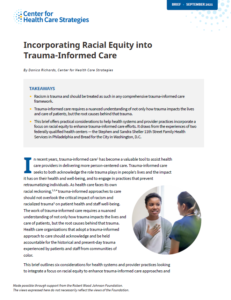
In recent years, trauma-informed care has become a valuable tool to assist health care providers in delivering more person-centered care. Trauma-informed care seeks to both acknowledge the role trauma plays in people’s lives and the impact it has on their health and well-being, and to engage in practices that prevent retraumatizing individuals. As the health care sector, like many industries, faces its own racial reckoning, trauma-informed approaches to care should not overlook the critical impact of racism and racialized trauma on patient health and staff well-being. Health care organizations that adopt a trauma-informed approach to care should acknowledge and be held accountable for the historical and present-day trauma experienced by patients and staff from communities of color.
This brief outlines six considerations for health systems and provider practices looking to integrate a focus on racial equity to enhance trauma-informed care approaches and promote racial justice. It draws from the experiences of two federally qualified health centers — the Stephen and Sandra Sheller 11th Street Family Health Services in Philadelphia and Bread for the City in Washington, D.C. — that are participating in the Center for Health Care Strategies’ Advancing Integrated Models initiative, made possible through support from the Robert Wood Johnson Foundation.